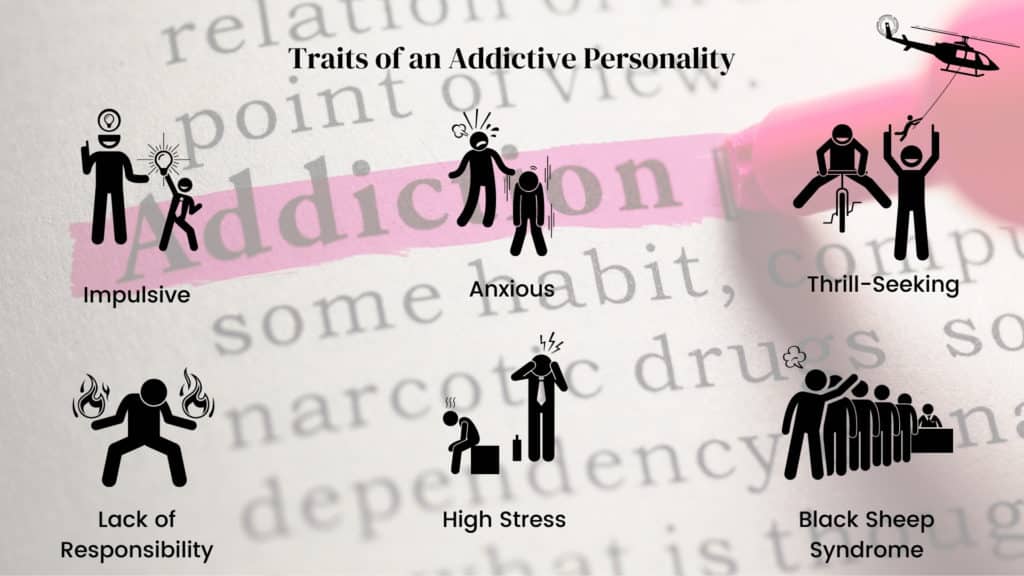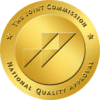Addictive Personality Traits: Facts and Fiction
We know that addiction is a serious plague in the United States. We hear about it on the news and from our friends all the time. Believe it or not, 1 in 10 people in the US will suffer from some type of substance abuse disorder in their lives, making it one of the most common ailments in the country.
Many people believe that certain personality traits lead to higher addiction rates and that some simply have an addictive personality. So what is an addictive personality really, and do they actually put you at a higher risk for addiction? Let’s talk about that.
What Is An Addictive Personality?
We’ve all heard the phrase at one point or another, so what does it actually mean? Well, an addictive personality disorder is supposed to be when somebody gets addicted or dependent on things frequently, and this can show up in any aspect of their life.
It will also be different from person to person. Someone may find themselves being addicted to games on their phone, eating ice cream, and watching pornography. Another person may find themselves feeling addicted to chewing gum, running long distances, and watching videos on YouTube.
It is completely dependent on the person and their tastes, and with this type of personality, people tend to enjoy doing things in excess and finding new things to do over and over until they can’t do it anymore, it becomes a problem, or they get sick of it.
It is believed that these people, the ones who don’t care for moderation, tend to be more susceptible to addictions like smoking cigarettes, drinking, or doing hard drugs.
Addiction Can Affect Anyone
Now, let’s be very clear. You can go your whole life believing that you have the furthest thing from an “addictive personality” and still wind up suffering from an addiction. This could start with prescription medicine, a mental health disorder, or even a dare.
It doesn’t have to be drugs. There’s a reason that over 42% of Americans are obese. Overeating affects the brain in a similar way to substance abuse disorders.
Addiction is far more complicated than simply having an addictive personality or not, so take the expression with a grain of salt. However, there are certain traits of people’s personalities that could ultimately lead to a higher risk of addiction. Let’s look at that.

Traits Of An Addictive Personality
The most important part in understanding whether you or a loved one has an addictive personality is to understand the traits to look for. While there is far more extensive research into addiction itself than the personality types most susceptible, these traits are common among addicts.
1. Impulsivity
This is probably one you were expecting to see on the list, and for good reason. People with addictive tendencies don’t just wake up in the morning and say “I’m going to be addicted to this today.” Rather, they are driven to act on their impulses instead.
Impulsivity is a very common trait for those suffering from addiction, and it’s easy to see why. If you don’t stop and contemplate risks fully before making a decision, it can lead to dangerous choices.
This could show up in financial situations, making impulsive purchases frequently, or it could be making comments before thinking them through. It depends on the person.
Whatever the reward you are seeking may be, it is hard to turn something down when it’s put in front of you, especially in social settings. Doing your best to learn the skill of controlling your impulses will have positive effects throughout your whole life!
Remember, like everything else on this list, an impulsive person is not bound to become addicted to a substance. However, someone who is very impulsive overall may find themselves slipping into addiction more quickly, or be more willing to try a new substance than others if they feel they cannot control their impulses.
2. Anxiety
Anxiety, along with several other mental health disorders, is a common trait for people with substance abuse disorder, or addiction in general. The reason for this is that anxious people tend to feel more dependent on something if they believe it helps, and anxiety will increase dramatically without it.
For example, benzodiazepines like Ativan or Xanax could be addictive to anybody who takes them regularly. However, if they really work for treating your anxiety and you feel an attack coming on, you’ll be likely to start taking them more and more often. This only feeds the addiction.
People with anxiety tend to build a tolerance to whatever calms their nerves, creating a vicious cycle. For example, it could start with fidgeting with a toy, then move to fidgeting and smoking cigarettes, then adding alcohol, and more. Anxiety needs to be treated properly to avoid this. With any type of mental health disorder, self-medicating is a common pathway to addiction and should be avoided at all costs.
3. Seeking Thrills Or Sensations
This could mean a lot of things and it can look different for every person. Maybe you’re constantly seeking the feeling of being full after eating a large meal or maybe you seek the sensations of human contact.
The word “sensations” covers a large spectrum, so this will mean something different for everybody. Everybody seeks out some kind of sensation from time to time, but it becomes a risk factor when that feeling is overwhelming and constant.
Those who seek out sensations in the form of risk-taking are definitely at a higher risk of addiction. Somebody who likes to jump out of planes with a parachute is a lot different from somebody who does parkour across buildings without safety equipment.
If you wind up never feeling satisfied by the sensations you’re seeking out, and you always want to up the ante, imagine the difference between wanting more from a roller coaster as opposed to a hard drug that you depend on. This type of behavior is very concerning for substance abuse disorder, so be aware of this trait if you believe you have it.
4. Lack Of Responsibility
People who constantly shift blame onto others, or find it difficult to take responsibility for their actions, tend to have an easier time convincing themselves they’ll be fine with any decision. They’ll also have an easier time convincing themselves that issues that arise from addiction are somebody else’s fault and that their decisions aren’t a big deal.
This is a troubling trait for anybody to have, regardless of any addiction concerns. Talking about this with a therapist is a really good start if this is a concern.
5. High Stress
People with high levels of stress, or those with a low tolerance for it, often seek an escape. Well, substances offer a sense of escape. However, so does reading, watching a movie, going for a jog, and a lot of other healthy stress management techniques.
While this isn’t an immediate risk factor, it does often translate to addiction when left untreated. Maintaining high levels of stress over the long haul is not sustainable and will need to be managed somehow. Unfortunately, substances like alcohol, prescription drugs, and other hard drugs offer that escape in an easy-to-use form.
6. A Sense Of Being Different
Have you always considered yourself the black sheep? Well, self-described nonconformists, and people who believe themselves to be fundamentally different from everybody else, make up a large portion of those in addiction treatment. The reason is simple. Social isolation and a lack of perceived support can lead to a dangerous mental state and decision-making.
Myths Of An Addictive Personality
So, are addictive personalities even real? We’ve mentioned the traits, what it is, and that there isn’t enough scientific research on the subject. We also mentioned that people may have “addictive” tendencies toward a lot of things. This could be their television, pornography, sex, gambling, or more. Is that the same type of addiction as heroin?
Well, it depends on how experts define the term “addiction”. Some professionals may argue that the term becomes meaningless if it’s used for so many everyday activities, while many would disagree.
Many professionals would say that the same reason you can’t stop using heroin is the same reason someone else can’t stop training for your marathon. The feelings are the same, but there’s still a difference. Enthusiasm over your running goals adds to your life while addiction takes away from it.
The difference is that the runner is working to improve their life, they have goals they are trying to accomplish, and they are working hard toward them so they can keep doing it. Someone abusing heroin may be working hard to stop doing it.
Because of this, the person who is “addicted” to running isn’t necessarily more susceptible at all to falling victim to substance abuse disorder. That’s the key distinction between enthusiasm and addiction, whether it’s harming or helping you.
Why It Matters
All in all, an addictive personality probably isn’t exactly what you thought it was. If you find yourself “addicted” to a TV show or a book, you’re just human. There are traits that can put you at higher risk but they aren’t what many say they are.
This distinction, and the acknowledgment that addictive personalities aren’t what we believe them to be, is important because it puts others at a greater risk. If you fully believe that only people with certain personality traits or mental health disorders are susceptible to addiction, it puts you at a greater risk.
However, the opposite is also true. If you believe that your personality traits put you at a higher risk for addiction, especially with a family history, then knowledge is power. You can do your best to prevent that terrible fate from taking hold in your life and work toward finding that passion that makes you feel that good “addiction” feeling. Whether that’s learning an instrument, lifting weights, or anything that you enjoy!
Remember, over 50% of Americans have tried an illicit drug in their lifetimes. It does not take a really impulsive or thrill-seeking person to make that initial decision, so don’t consider yourself safe!
What To Do If You Think You're At Risk
If you’ve read the traits that make up an addictive personality and you think you fit the description, the best thing you could do is avoid addictive substances and work on your impulsiveness. Anybody can be prescribed an addictive medication for a wide range of ailments, and if you aren’t taking risks into consideration (or even aware of them), this could cause problems down the line.
Now, as we said, addictive personalities aren’t exactly “real” in a scientific sense, but if you believe yourself to have addictive tendencies, then it’s best to actively practice moderation or abstinence. Abstinence is especially appropriate if you have a family history of addiction.
If you believe you’re at risk and you’re worried about mental health factors that could lead to substance abuse disorder, the best thing you could do is get treatment. Speaking to a therapist, especially during the pandemic, is a good idea even for healthy people. Let them know about your tendencies and fears so they know to avoid addictive medications and can offer you the best help.
If you’re currently addicted to a substance or recovering, you may want to seek drug counseling therapy to get the right kind of help for your situation.
Stop It Before It Starts
If you believe you have an addictive personality, there are steps you should take to avoid any harmful addictions in your future. Find something you love to do, do what makes you happy, treat any mental health disorders, and stay informed. If you have any questions or if you’re looking for addiction treatment, contact us today and we’ll be happy to help you! Stay safe!
Sources
- Centers for Disease Control and Prevention. (2021, June 07). Adult Obesity Facts. Retrieved from https://www.cdc.gov/obesity/data/adult.html
- National Institutes of Health. (2015, November 18). 10 percent of US adults have drug use disorder at some point in their lives. Retrieved from https://www.nih.gov/news-events/news-releases/10-percent-us-adults-have-drug-use-disorder-some-point-their-lives
- Scott, E., MS. (2021, July 29). 17 Highly Effective Stress Relievers (R. Goldman PhD, FTOS, Ed.). Retrieved from https://www.verywellmind.com/tips-to-reduce-stress-3145195
- T, B. (2021, March 12). The Types of Drugs Most Likely to Be Abused in America. Retrieved from https://www.verywellmind.com/rates-of-illicit-drug-abuse-in-the-us-67027




